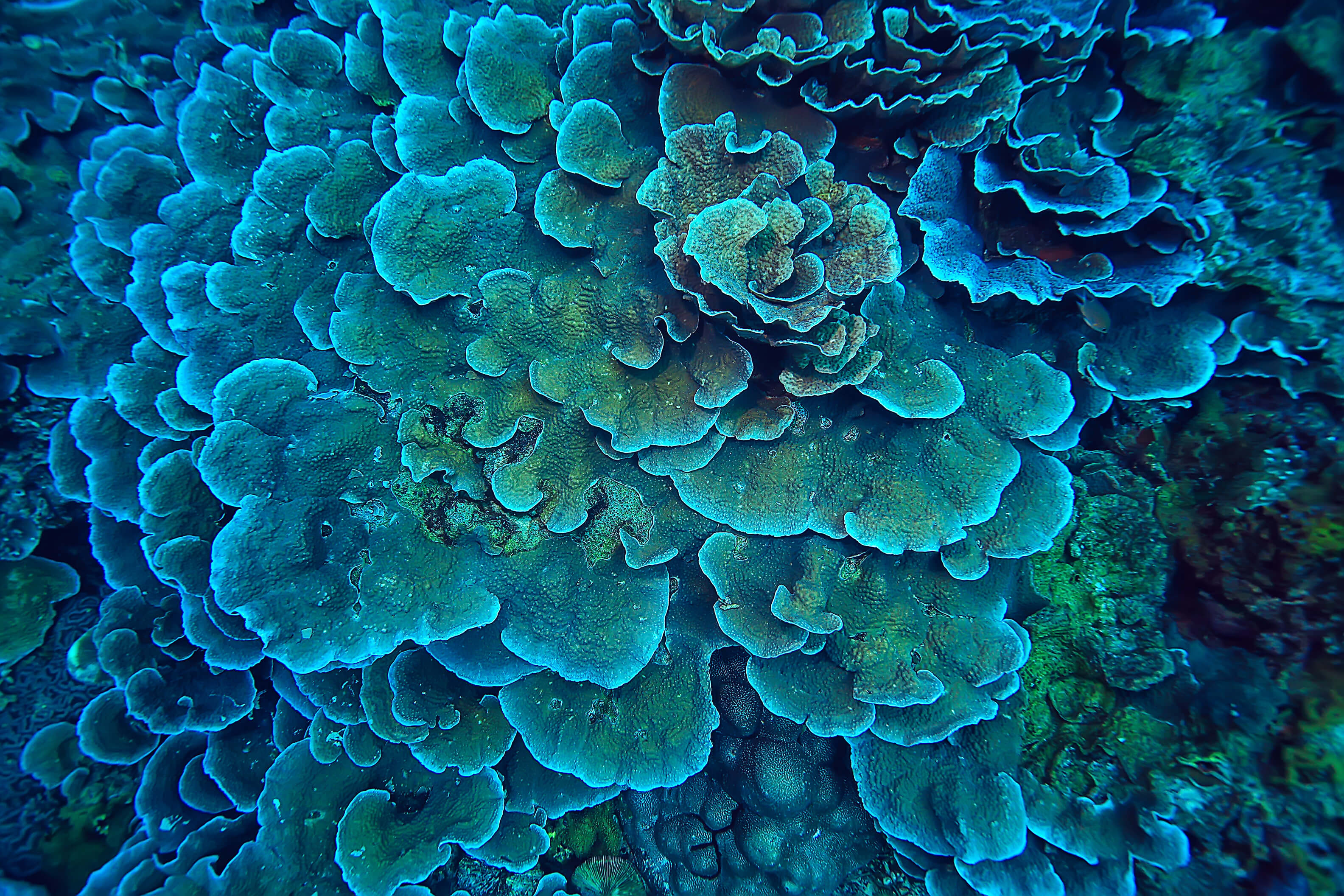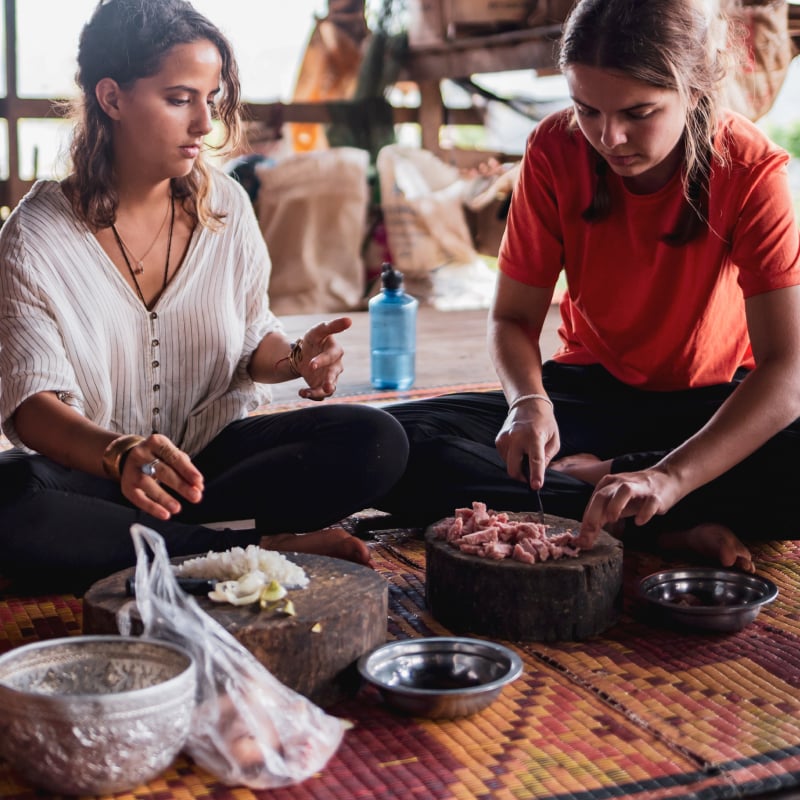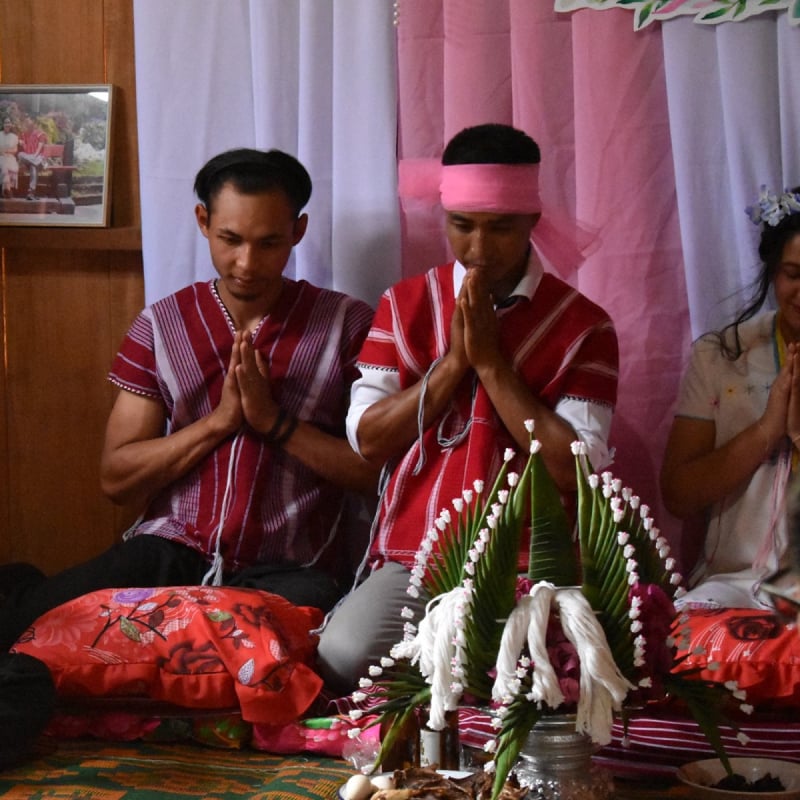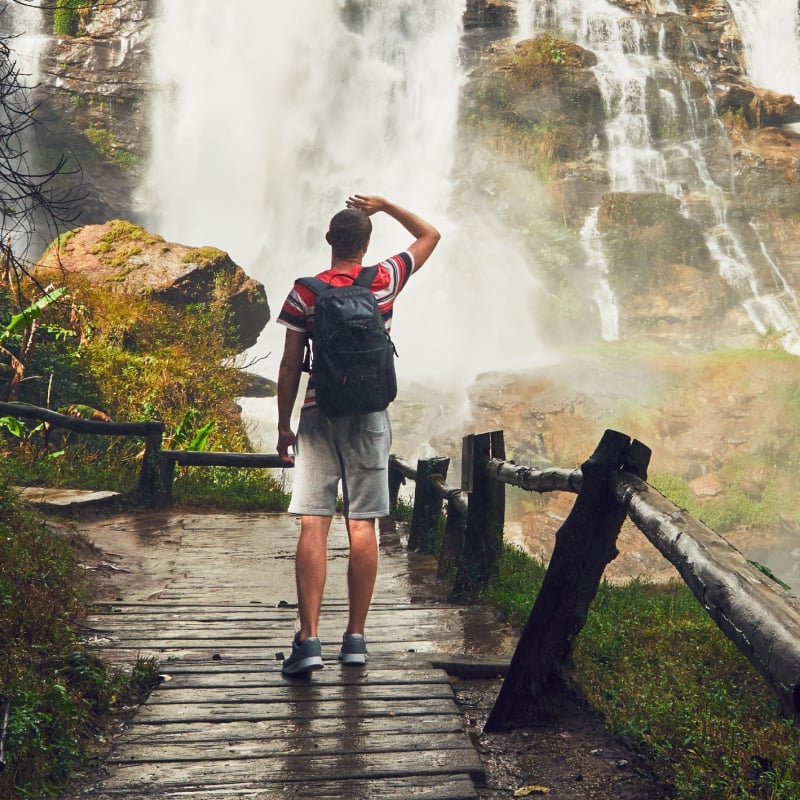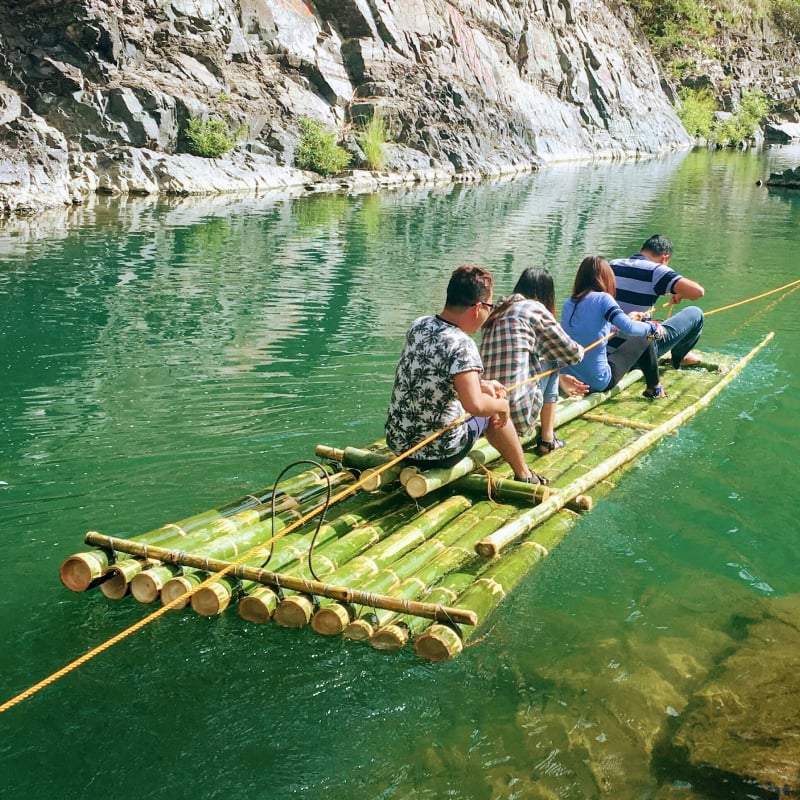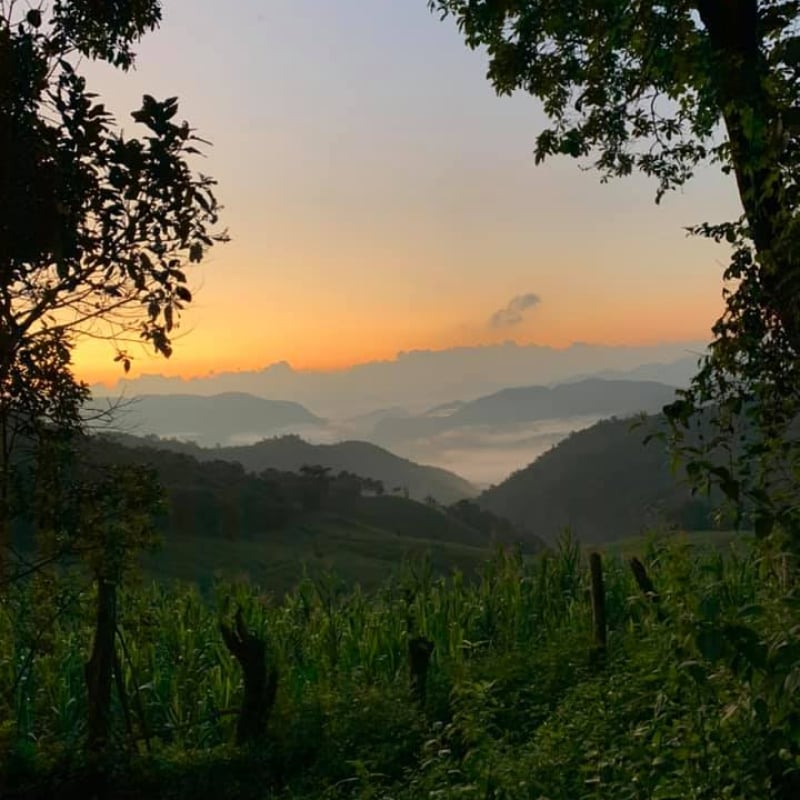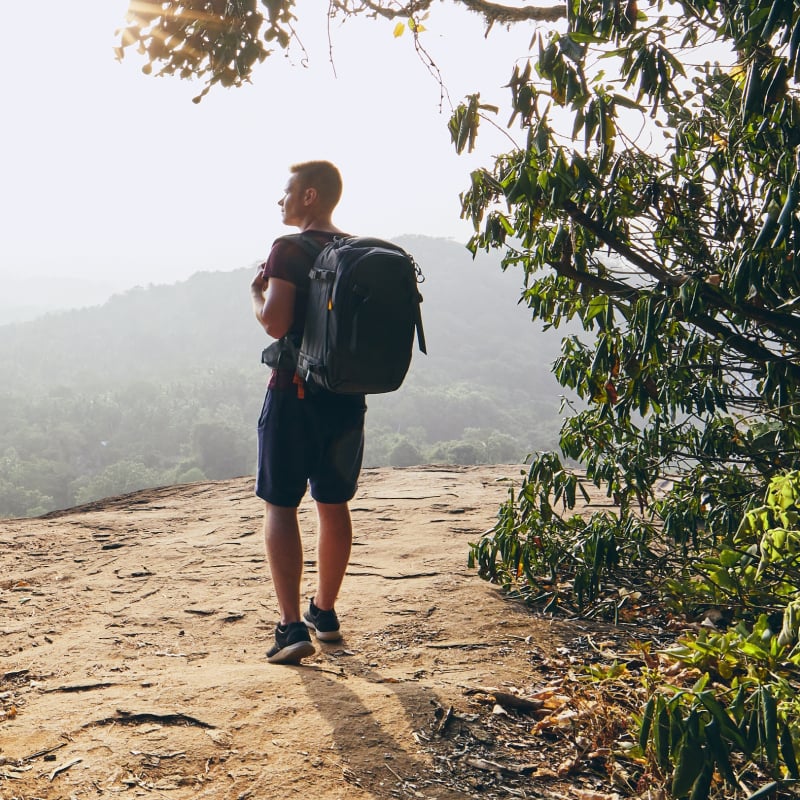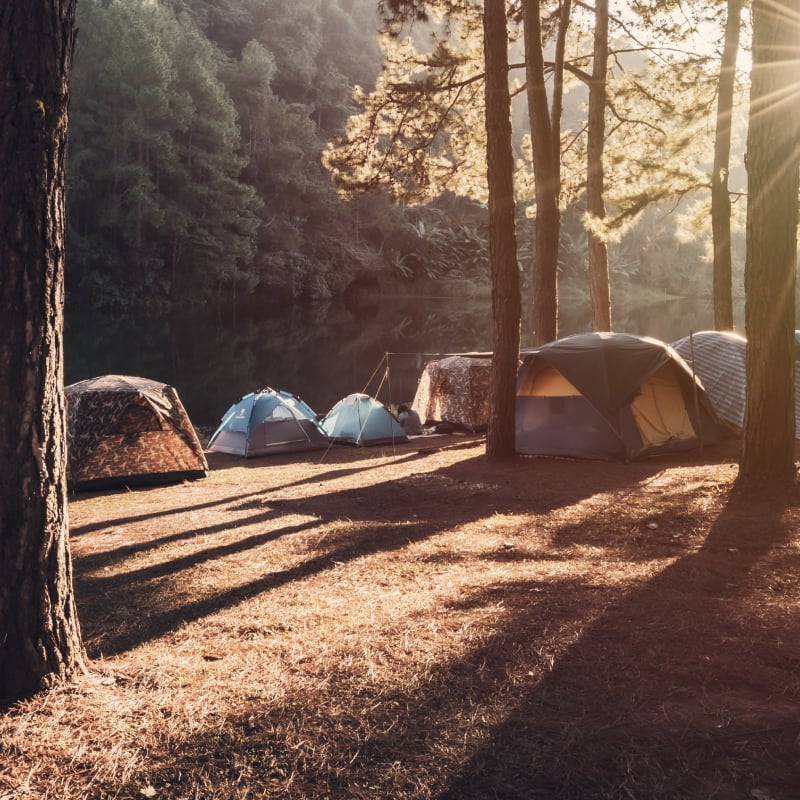
The forest is calling
Gibbon Conservation Volunteering in Thailand
Contribute to the conservation of endangered gibbons in Chiang Mai.
Program information
Experience the beauty of Northern Thailand’s mountains and forests while helping to protect the local gibbon population. Learn about these long-limbed primates by assisting conservationists with tracking, photographing and documenting their behaviour. You’ll also have the opportunity to immerse yourself in the culture of the local Karen community, and observe elephant conservation projects.
Flights
Program overview
Follow the lead of local conservationists as they take you on a hike through ancient forest paths – patiently waiting for the famous song of the gibbons. With exceptionally loud vocals, male and female gibbons often perform synchronised duets at dawn that can be heard up to three kilometres away.
When you volunteer with gibbons in Thailand, you’ll help local conservation teams record sight and song observations about gibbons. This data will assist scientists in gathering more knowledge about the ecology and conservation status of gibbons in Chiang Mai – information that is currently relatively unknown.
You might wonder what your role will be, practically? Well, you’ll typically help plan and prepare surveys and GPS tracks, set up camera traps, take photographs, record gibbon songs, capture observations on data sheets, and then enter it into a central database system.
Although there are about 20 species of gibbons found in Southeast Asia, the areas surrounding GVI’s hub in Chiang Mai are home to the white-handed gibbon. These small furry apes hold large territories, move very fast and love hanging high up in the tree canopy – so you’ll develop specialised skills to help you spot and track them in the wild.
Aside from working with gibbons, you can also join morning elephant hikes. On these outings, you’ll collect behavioural data on resident Asian elephants and learn more about the Karen elephant-keeping community. You’ll also help conservationists capture information about other endemic mammals and birds in the area, and attend weekly bio ID sessions to help you identify species better.
During your stay you’ll have the unique opportunity to interact with local families in the village of Huay Pakoot, and become integrated into the Karen community culture through cooking classes, language lessons, basket weaving and clothes weaving workshops.
Highlights








Activities
Some of the example typical activities you could participate in on this program.





Skills
- Data collection
- Data entry
- Population ecology
- Species identification
- Survey research
- Wildlife conservation
Partners
Some of the partners we work with on base.
Program details
Dates and prices
Itinerary
06:30

06:30
07:00

07:00
08:00

08:00
12:00

12:00
12:30

12:30
14:00

14:00
16:30

16:30
17:45

17:45
18:00

18:00
19:30

19:30
22:00

22:00
What’s included?
General | |
|---|---|
| Food | |
| Safe and basic accommodation (usually shared) | |
| Airport pick up (unless stated) | |
| All project equipment | |
| 24-hour in-country support from local staff | |
| 24-hour emergency desk | |
| GVI Experiences |
Activities | |
|---|---|
| Sustainable project work | |
| Data collection and research |
Pre-program training | |
|---|---|
| Pre-departure webinar | |
| Pre-departure training (online) | |
| University of Richmond endorsed specialisation course |
Welcome training | |
|---|---|
| GVI welcome presentation | |
| Health & safety | |
| Local culture & environment | |
| UN SDGs | |
| Impact & ethics | |
| Child protection |
Certificates | |
|---|---|
| Program certificate | |
| University certificate – specialisation (University of Richmond) |
Not included |
|---|
| Flights |
| International and domestic airport taxes |
| Medical and travel insurance |
| Visa costs |
| Police or background check |
| Personal items and toiletries |
| Additional drinks and gratuities |
Life On Base
Base Photos
Located in the heart of Northern Thailand, our research station in Chiang Mai is surrounded by breathtaking mountains, fields and forests. With beautiful hills all around, we have a bird’s-eye view over the fields and forests below. In the rainy season, the clouds roll through the base at eye level. Being the middle of the jungle, elephants can be found throughout the surrounding areas.
When you arrive you’ll be welcomed by the villagers with a traditional Geju ceremony, which they perform for all new participants upon their arrival. During the Geju, food is blessed and pieces of string are tied onto others’ wrists to wish them good fortune.
The project work takes place in the Mae Chaem District, a 5-hour journey deep into the mountains, where the famous Karen elephant-keeping community resides. This community shares a unique and sacred relationship with elephants.
From our research station it’s about a 50-minute walk to the river where you can see buffalo walking about. Despite being very afraid of people and quite shy, you might sometimes see them in the village. The open-air base is divided into two buildings. The older building is usually reserved as a study area – or for staff meetings, presentations and lectures. It has a table with chairs, a hammock for reading, and a few small desks. The newer building is where people socialise. The library is in the new building. It’s small and basic, consisting of a few bookshelves.You can catch some amazing sunsets right at the base, and when night comes, kick back and enjoy stargazing around the fire pit we often hang out at in the evenings. During free nights, we like to watch movies on the projector, visit a villager’s home, or take a night stroll. Games (board and card games) are well received and enjoyable to interact with the local community members. There are also a few friendly dogs around the base.

Accommodation

Transportation

Communication

Meals

Climate
GVI experiences included in your program, at no extra cost.
We want you to make the most of the chance to live in – and contribute towards – the most diverse and unique wildernesses and communities on earth. Introducing GVI Experiences – immersive adventure, cultural and wellness activities exclusive to GVI that have been specially designed in collaboration with our local partners to support and stimulate sustainable economic development.
Enhance your impact. Expand your adventure. Explore your world.
Free time & cultural immersion
By joining a GVI program, you not only contribute to preserving unique ecosystems but also get the chance to explore the surrounding area or venture further to see what else the region has to offer on weekends.
Our field staff are a great source of advice on local travel options. Many participants choose to travel before or after their experience, solidifying friendships made on the program.
Engaging with a new context teaches global awareness, adaptability and critical thinking – skills highly valued in today’s world. Cultural immersion is encouraged, and there are many activities to enjoy during your free time or before and after your program. Please note, these suggestions aren’t included in the program fee and are at your own expense.

Spirituality and religion

Cooking

Festivals

Languages
Weekend trips

Pai
Local adventures

Karen culture

Village celebrations

Night in the forest

Football, volleyball and ultimate frisbee

Hiking trails

Smoothies, noodles and fashion

Movie nights
We have a projector at base as well as a large selection of movies. Sometimes we take a vote on which one to put on after dinner (or when we have a quiet afternoon).

Gym
If you need to get a workout in, you’ll find our gym on the lower floor of our base hut. It includes a gym bench and weights.

Ping pong
On the lower floor of our base hut, you’ll find a ping-pong table. Don’t be surprised if you find yourself engaged in a heated ping-pong tournament against some of the mahouts!
Speak to alumni

If you’d like to find out what the experience of joining a GVI project is really like, simply contact us and we’ll put you in touch with one of our many Alumni.
We’ll try to match you to an Alum based on your location, nationality, age, stage of academic career, gender, and program interests. This allows you to gain insights into the experience that is most relevant to you.
Depending on your location you might be able to speak to an Alum over the phone or online, or meet up with them face-to-face at a coffee shop nearby. We also run a series of small events around the world where you can speak to GVI Alumni, Ambassadors and staff members.
Get a first-hand perspective
Meet the team
Get acquainted with the GVI Asia, Thailand, Chiang Mai family

Jonathan Berry
Program Manager
This is Jonathan, the Program Manager at our Chiang Mai base in Thailand. He has joined us from Liverpool in the United Kingdom and has visited this base as a volunteer on seven ...

Liam Ingram
Senior Program Coordinator
Hi I’m Liam, from Shropshire in England. Before working here I worked in horticulture and I’ve been looking to utilise my green fingers here. I’ve been to 3 GVI Hubs in the last ...
Parent Info
‘If only every student could do this. It changes your life in all the right ways,’ says Chris Heritage, parent of Luke Heritage, one of our teen volunteers who has participated on two GVI programs, one in Costa Rica and another in South Africa.
We are a parent-run organisation that is incredibly serious about health and safety, and increasing the impact, as well as the long-term career benefits of our programs. Our programs help young people develop the skills to select a career path that is personally fulfilling, and live a life aligned to the well-being of our planet and the global community.
GVI is a proud member of the Gap Year Association.
Ken and Linda Jeffrey, whose son Sam volunteered with GVI in Thailand, talk about how the experience affected Sam. He also went on to volunteer with GVI again in South Africa. ‘I know it sounds like a cliche but in a sense, he did go away as a boy and he came back as a young man. Both of us could recommend GVI without any hesitation to any other parent thinking about exploring an opportunity for their children to explore the world and to see different parts of it.’
Parent Info Pack
Download the Parent Pack and learn more about:
Our staff: All our projects are run by staff, selected, vetted, trained, and managed by our central office.
Health and safety: Our safety practices include a child and vulnerable adult protection policy and high participant ratios.
Staying in touch: See what’s happening on base, by following a hub’s dedicated Facebook page.
Free parent consultations: We would love to talk to you about exciting opportunities available for your child.
Arrivals



When it comes to support, we ensure that each participant is provided with unparalleled, 360 degree support, from your initial contact with the GVI Family, all the way through your program, and even after, as you become part of the GVI Alumni Team.
As part of this promise, we will ensure, whenever possible, that one of our dedicated staff will be available to meet you at the airport. In most locations, we also set up a Whatsapp group to help with managing airport arrivals.
We will arrange with you prior to your departure that, should you arrive in the agreed upon pick up window, a member of our staff will be there to welcome you, easily identifiable in a GVI t-shirt or holding a GVI sign and wearing a friendly smile.
This means there will be someone there to greet you as you land, and from there you will be transported to your GVI base to start your adventure and meet the rest of your team.
Flights


Please note that if you use this service delivered by Student Universe and / or if you buy your ticket through this portal you are agreeing to the Student Universe Privacy Policy and Terms and Conditions. Your agreement regarding flights will be between you and Student Universe or as per their terms and conditions.
As GVI is providing this portal as a service we are not responsible for the accuracy of this site.
We are also not responsible for any loss, damage (including loss of profits or consequential damages), injury, illness, harm or death in relation to your flight and travel arrangements.
Your Impact
All of our programs have short-, mid- and long-term objectives that align with the United Nations Sustainable Development Goals (UN SDGs). This enables us to report on our collaborative impact across the world in a streamlined manner, measuring which UN SDGs we are making a substantial contribution to. Furthermore, this will help our local partners and communities measure and visualise their contribution to the UN SDGs.
Prior to your arrival on base, you will be educated about the UN SDGs. Then once you arrive on base, you’ll learn about the specific goals we have in this particular location, our various objectives, and also clarification of how your personal, shorter-term involvement contributes to these.
Our aim is to educate you on local and global issues, so that you continue to be an active global citizen after your program, helping to fulfil our mission of building a global network of people united by their passion to make a difference.

GVI Chiang Mai’s programs work in collaboration with the local Karen hill tribe community and village of Huay Pakoot. To promote sustainable ecotourism, we work with the elephant-keeping community to assist monitor the introduction of elephants into their natural habitat after their previous lives in tourist camps.
Your contribution will assist in keeping these elephants in protected forests, continuing the conservation of these beautiful animals and what remains of their fragmented forest habitats, as well as providing funding to keep the project running. We also offer alternative livelihoods and English lessons to the local community. Upskilling in English helps facilitate a self-sustainable ecotourism industry. The goal of this project is to have semi-wild herds of elephants living, socialising, and foraging in their natural habitat – supervised by their mahouts (elephant keepers) from the local village.
Elephant Surveys
We work with local mahouts to track elephants in the forest – collecting behavioural data through observation, taking note of the following:
- Two-minute interval activity budget on each elephant.
- Interaction with other elephants.
- Vocalisation recordings (written not audio).
- Monitoring stereotyping behaviour.
Every week we do a health check (eye drainage, tongue check etc.) It’s important to note that we have a hands-off approach.
Gibbon surveys
We gather data from song and visual surveys of white-handed gibbons, assisting scientists in expanding their understanding of gibbon ecology and conservation status in the Chiang Mai region. Typically, you’ll assist in survey planning, GPS tracking, camera trap setup, photography, gibbon sound recording, data sheet entries and database input.
Biodiversity Hikes
We conduct day and night biodiversity hikes, recording any species we see, including birds, gibbons, bats, snakes, reptiles, lizards, amphibians, frogs and toads. We add the images to iNaturalist and eBird.
Quality Education
We work with the local government school – with both teachers and students. Our school-based teaching involves English language, health and wellness workshops, environmental education workshops and sports activities. Our community-based lessons involve adult and child learners in the community. These are often informal evening sessions, based around what the learners want to learn.
The UN Sustainable Development Goals
All of our programs have short-, mid- and long-term objectives that align with the United Nations Sustainable Development Goals (UN SDGs). We want to be able to measure our collaborative impact across the world in a streamlined manner, so all our staff and volunteers know which UN SDGs they’re making a substantial contribution to. This also helps our local partners and communities measure and visualise their contribution to the UN SDGs.
Prior to your arrival on base, you’ll be educated about the history of the UN SDGs. Then, once on base you’ll learn about the specific goals of your location, the long-, mid- and short-term objectives, and also insight into how your personal, shorter-term involvement contributes to these goals on a global level.
Our aim is to educate you on local and global issues, so that you continue to act as active global citizens after your program, helping to fulfil our mission of building a global network of people united by their passion to make a difference.
Project objectives
GVI Chiang Mai Long-term Objectives:
1. Increase and promote ethical elephant tourism.
2. Create a viable self sustaining ecotourism program for the village.
3. Improve standards of living and job opportunities for the community in the Huay Pakoot village.
4. Improve sustainable natural resource management in the Huay Pakoot area.
5. Ensure the preservation and study of a thriving population of wild white-handed gibbons in the Huay Pakoot area.
Publications
The best decisions in international development and conservation cannot be made without accurate and up-to-date data or informed research. Our many field teams around the world collaborate with local and international partners to analyse data and draw conclusions. In addition, many of our participants have used research they have collected on their various GVI projects to complete their Masters, Doctorate, or postdoctoral studies. We also run a fellowship program which connects postdoctoral researchers at globally-respected universities with our many sustainable development programs around the world to support their research and ensure continuous improvement of our best practices on base.
All of our publications are on Google Scholar
GVI Thailand Chiang Mai 2019 Annual Report
GVI Thailand Chiang Mai Annual Report 2018
‘Avian Diversity as a Measure of the Impact of Megafauna Reintroduction into Evergreen Montane Forest.’
International Ornithological Congress of Southeast Asia Conference in Thailand
Our Ethics
Below is a list of core ethics and best practices we believe are essential to the operation of high quality, ethical volunteer and sustainable development programs. We believe that all responsible volunteer and sustainable development operations should focus upon these principles. If you are considering volunteering, these are some of the key considerations you should question, to ensure that your time and money contributes towards positive change.
We want to constantly develop our own understanding of ethical best practice. In so doing, we aim to provide an exemplary industry standard for other education institutions, international development organisations, and social enterprises. Our Badge of Ethics stands for the drive to always do good, better. Find out more, click on the Badge below.
Our 10 ethical commitments
01
Locally Driven, Collaborative Projects
We aim to design all our projects in collaboration with local organizations and communities and ensure that they are locally driven.
02
Clear Objectives & Sustainable Outcomes
We aim to clearly define short-, mid-, and long-term objectives with sustainable outcomes for all our projects.
03
Impact Reporting
We aim to track, record, and publish the impact of each of our projects.
04
Working Against Dependency
We aim to build in-country capacity by assisting local organizations in becoming self-sustaining.
05
Responsible Exit Strategies
For each local organization we work with, we aim to have a plan in place for withdrawing support responsibly.
06
Clear Roles & Specialized Training
We aim to ensure that every participant is assigned a clear role and that they are fully trained and supported to carry out their work by specialized staff.
07
Respect for all
In all our actions we aim to respect the skills and efforts of all and seek to protect the rights, culture and dignity of everyone who engages with GVI.
08
Local Ownership
We work to ensure that credit for the results of any project, along with any data collected, research conducted, or Intellectual Property developed, remains the property of local organizations.
09
Transitioning from the Orphanage Model
We do not condone and aim to withdraw support of orphanages and residential care centers.
10
Child and Vulnerable adult policies
We will live by our Child Protection and Vulnerable Adult policies.
Continual Development
As an organization, GVI is committed to striving toward best practice, and to educating both our potential participants, our partners, and the world at large about them. Both the volunteering and sustainable development sectors are increasingly, and rightly, under scrutiny. Many recent local and global articles highlight poor practices and questionable ethics. GVI is widely recognized for striving to apply global best practice in the volunteering, education and sustainable development sectors throughout our operations by reputable organizations such as ChildSafe.
However, global best practice is always evolving and we dedicate both time and resources to engage with internationally respected experts and learn from the latest research to ensure our programs both fulfil their potential to create maximum positive impact, and minimise their potential to create unintentional negative impact. Along with and as part of the sustainable development and volunteering community, we are constantly learning and applying this learning to practice. We do not always get everything right, but we seek feedback from our community members, partners, participants and our staff, and react accordingly. We know are already doing a great job, and feedback we have received confirms this, but we aim to do even better and are continuously refining our operations to improve upon our already excellent reputation.
Program ethics
No orphanage programs
We don’t support or allow participants to work in institutional residential care facilities, also known as orphanages. We partner with ReThink Orphanages and Freedom United.
Child and vulnerable adult protection policy
Our Child and Vulnerable Adult Protection Policy requires all our staff and participants to complete a criminal background check and to learn why you shouldn’t reveal a child’s identifying factors in photographs. We support the ChildSafe Movement.
No medical volunteering
We don’t offer any programs where our participants engage in medical treatment. This is because our participants aren’t typically qualified to do this work and would therefore not be able to do this work in their home country. Our participants only assist with public health programs.
No disability support programs
We don’t offer any programs where our participants work directly with people with disabilities. This is because our participants aren’t typically qualified to do this work and would therefore not be able to do this work in their home country.
Aligned to local objectives
Each one of our initiatives is aligned to objectives set by a local organisation or professional. Our staff and participants work to support these local actors in achieving their specific goals.
Local employees remain employed
Our participants don’t replace the staff employed by local organisations. Rather, they support currently employed staff with achieving their objectives. Our goal is always to increase local capacity to address local problems.
Local employees remain focused
Participants require training and support to ensure that they carry out tasks correctly. Our staff provide this training and support so that local staff can focus on what is truly important to their organisation at the time.
No entertainment-based activities
We don’t support the use of wild animals for entertainment purposes. This includes riding animals, having them perform tricks, feeding or bathing them or getting close to them to take photos
No orphaned animal sanctuaries
We don’t encourage, support or allow the rearing of “orphaned” wild baby animals kept at a “sanctuary”. The conservation value of these types of programs is negligent and would only ethically be used in extremely rare cases
Guidelines for touching or movement restriction
When wild animals are restricted for conservation purposes we follow the guidelines of Fair Trade in Tourism South Africa (FTTSA), approved by the Global Sustainable Tourism Council.
Animal welfare guidelines
We ensure that the Five Freedoms of Animal Welfare are followed. These include the freedom to express normal behaviour and freedom from distress, discomfort, hunger, thirst, fear, pain, injury or disease.
Local community empowerment
We ensure that conservation efforts are also always locally led, that community needs are front-and centre of any conservation effort and that our participants, projects and partners work to increase local community engagement in local conservation efforts.
No veterinary programs
We don’t offer any veterinary programs or animal rescue and rehabilitation programs. We don’t allow participants to do any work they would not be able to do in their home country.
Training
A GVI program is an investment in your career. No matter which you choose, you will be working toward improving your employability by mastering new social skills, gaining further technical expertise and earning qualifications in many cases. Most of our staff are, in fact, GVI Alumni, and we have helped many of our Alumni discover, move toward, and earn their own personal dream jobs. Each program includes introductory workshops, ongoing presentations, as well as on-the-ground professional support provided by our very own trained staff members. In addition, our training programs are critical for helping us to ensure the long-term impact of our sustainable development projects around the world.
For all GVI participants
Orientation: Travelling Responsibly and Ethically
Learn about the importance of child and vulnerable adult protection best practices and how to apply them while on project.
Orientation: UN Sustainable Development Goals
Introduction to the history and evolution of sustainable development, the United Nations Sustainable Development Goals (UN SDGs) and how these related to your project work.
Orientation: Further Opportunities for Impact
Learn about our country locations and further opportunities available to you during or after your program.
For all participants at Chiang Mai
Conservation: survey techniques and logistics
An introduction to different survey techniques and best practice guidelines for surveys; introduction to different types of data and how to record information via a datasheet.
Conservation: biodiversity & target species identification
Learn about biodiversity and how biodiversity is measured, and classifying different species and how to identify species that indicate the health of the habitat.
Certificates & qualifications

GVI Online Wildlife Conservation course (optional)
If you have a passion for wildlife conservation then this course will provide you with the foundational skills and understanding needed to achieve your conservation-related goals. You’ll learn about the various methods of wildlife monitoring, as well as exploring the delicate balance involved in terrestrial ecosystem management. After successfully completing the course, which you have the option of doing prior to your in-country program, you’ll receive a certificate from the University of Richmond.
This online course, valued at £295, is included in all volunteering programs. Full course details can be found here.
Support & Safety
We won’t sugarcoat it — traveling abroad is usually a complex process that carries an element of risk. But this is exactly why we’re passionate about providing extensive support throughout the process as well as the highest safety standards during the in-country phase. We believe that volunteering abroad should not only be impactful, but an enjoyable experience that carries as little risk as possible. This is exactly how we’ve been able to maintain our reputation as the most highly respected volunteering organisations in the sector over the past two decades.


Health and safety case studies

How GVI upholds health and safety

GVI's commitment to safety and security

How GVI remains prepared for natural disasters

How GVI manages participants expectations
Make the most of our unique programs with these exclusively curated local adventure and wellness experiences.
















Want to connect with some of our past participants about their adventures? Get in touch with hundreds of friendly ambassadors all over the world who would be more than happy to answer any questions.



